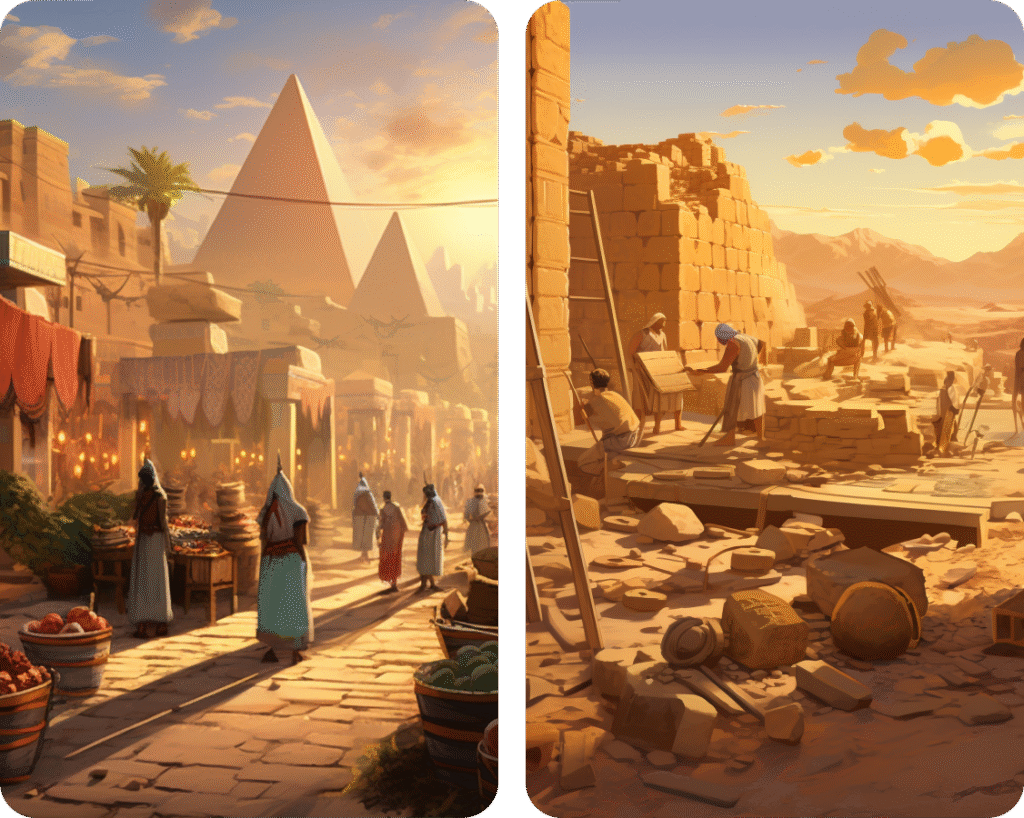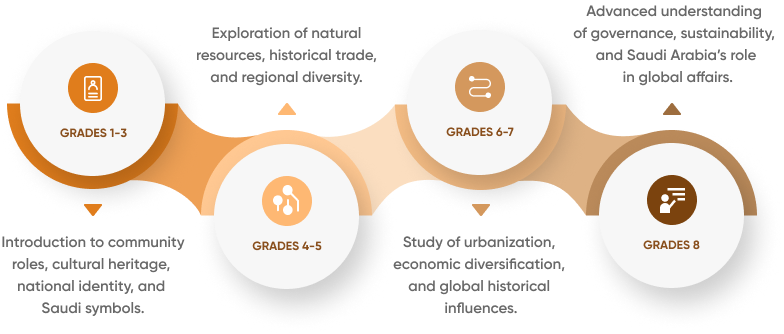
The Social Science Curriculum
Key Focus Areas


1
Introduction to My World
Introduction to My World
History
Introduction to family, school, and community history. Simple stories about famous figures like King Abdulaziz.
Geography
Basic geographical concepts (homes, landforms like mountains, deserts). Introduction to local places(e.g., Mecca, Medina, Riyadh).
Civics
Roles and responsibilities within the family, school, and community. Introduction to community helpers (police, doctors).
Economics
Basic needs vs. wants; introduction to money and simple trade.
Social/National Values
Respect, honesty, caring for others, introduction to Saudi symbols (flag, National Day).
2
Expanding My World
Expanding My World
History
More structured introduction to the history of the Kingdom of Saudi Arabia and key events (e.g., unification of the Kingdom).
Geography
Exploration of basic physical geography concepts (landforms, weather, simple map skills). Focus on the regions of Saudi Arabia.
Civics
Understanding rules, rights, and responsibilities in the community. A deeper dive into the roles of community helpers.
Economics
Simple introduction to saving, spending, and charity (Zakat). Basic trade concepts (how goods move from place to place)
Social/National Values
Focus on cooperation, responsibility, and national pride.
3
Communities and Cultures
Communities and Cultures
History
Introduction to different cultures within Saudi Arabia and basic world cultures. Early Islamic history and its influence on the world.
Geography
Basic understanding of natural resources (water, oil, land). Introduction to continents and oceans, using Saudi Arabia as a starting point.
Civics
Introduction to governance and leadership (e.g., mayors, local leaders). Emphasis on citizenship and the rights and responsibilities of individuals.
Economics
Introduction to local and global trade. Simple concepts of supply and demand.
Social/National Values
Respect for cultural diversity, importance of family and community, and Islamic values of generosity and charity.
4
Saudi Arabia in the World
Saudi Arabia in the World
History
Overview of the key periods of Saudi Arabian history, from ancient times to the modern day, focusing on Islamic civilization and the development of the Kingdom.
Geography
Introduction to global geography—continents, major countries, and their relation to Saudi Arabia. More advanced mapping skills and physical geography.
Civics
Deeper understanding of governance (e.g., councils, ministries), roles of leaders, and how citizens can contribute to society.
Economics
Understanding of goods and services, how people work and earn money, and basic market functions. More about saving and charity, with examples of how Zakat works in society.
Social/National Values
Leadership, cooperation, national pride, Islamic values.
5
Early Civilizations and Trade
Early Civilizations and Trade
History
Study of early world civilizations (Mesopotamia, Ancient Egypt, Indus Valley, Ancient China) with connections to Saudi Arabia’s historical trade routes and contributions.
Geography
Study of the Earth’s major physical features, including mountains,rivers, and deserts. Introduction to human-environment interaction
Civics
Introduction to the basic structure of the government and its functions. How laws are made and enforced.
Economics
Deeper dive into trade, resources, and how they have historically influenced the development of civilizations.
Social/National Values
Cultural sensitivity, global awareness, and the importance of trade and collaboration between nations.
6
The Islamic Golden Age and Exploration
The Islamic Golden Age and Exploration
History
Focus on the Islamic Golden Age, including scientific, cultural, and intellectual achievements and how these influenced the world.
Geography
Focus on global exploration and trade routes, especially the Silk Road, and how they shaped early economic systems.
Civics
Understanding of rights, laws, and the responsibilities of citizens in more depth. Begin discussions on environmental stewardship and sustainability.
Economics
Introduction to early global trade networks and the beginnings ofmodern economic systems.
Social/National Values
The role of Islamic scholars in the advancement of global knowledge. Focus on environmental responsibility.
7
Empires and Nations
Empires and Nations
History
Study of major empires (Ottoman, Roman, Persian) and their influence on modern borders and governance systems.
Geography
Exploration of human geography, including migration, urbanization, and the development of cities.
Civics
Introduction to the concept of governance beyond the local level—how nations are governed and the role of international organizations (e.g., the United Nations).
Economics
Deeper understanding of natural resources, their distribution, and their impact on national economies. Focus on Saudi Arabia’s role in the global economy (oil).
Social/National Values
Emphasis on leadership, responsibility, and how cultural exchanges have influenced the modern world.
8
The Modern World and Global Issues
The Modern World And Global Issues
History
Exploration of major events of the 20th century (World Wars, decolonization, and global conflicts) with a focus on Saudi Arabia’s role in modern history
Geography
Focus on modern issues such as climate change, global warming, and sustainable development, linked to geography
Civics
Study of modern governance systems,
including democracy, monarchy, and
international diplomacy. Begin exploring
Saudi Arabia’s Vision 2030.
Economics
The modern global economy—trade,
international organizations (e.g., WTO),
and the role of technology in economic
development.
Social/National Values
Emphasis on global citizenship,
responsibility toward the
environment, and understanding
the interconnectedness of nations.
1
Physical Geography & The Environment
KEY THEMES
Earth’s Physical Processes
Plate tectonics, climate systems, and ecosystems
Natural Resources & Sustainability
Water, land, energy, and conservation strategies
Human-Environment Interactions
Urbanization, agriculture, and climate change
Geographic Tools & Technologies
GIS, satellite imagery, and cartography
2
Human & Cultural Geography
KEY THEMES
Economic Geography
Global trade, resource distribution, and economic interdependence
Urbanization & Population Dynamics
Migration, city planning, and demographic shifts
Political Geography & International Relations
Geopolitics, conflicts, and diplomacy
Environmental Challenges & Sustainable Solutions
Urban sustainability and resource management
1
Foundations Of Civilizations
KEY THEMES
The Birth of Civilizations
Mesopotamia, Egypt, Indus Valley, and China
Islamic Civilization & Global Contributions
Science, art, and philosophy
Empires & Trade Networks
Roman, Greek, Ottoman, and Persian Empires
Cultural Exchange & Conflict
Colonialism, revolutions, and societal transformations
2
Modern World History
KEY THEMES
The Age of Revolutions
Renaissance, Reformation, Enlightenment, and Industrialization
20th-Century Conflicts & Their Legacy
World Wars, Cold War, and regional conflicts
Globalization & Cultural Shifts
Economic interdependence, cultural diffusion, and social movements
Ethical Decision-Making in History
Historical injustices, human rights, and reconciliation efforts
1
Physical Geography & The Environment
KEY THEMES
Earth’s Physical Processes
Plate tectonics, climate systems, and ecosystems
Natural Resources & Sustainability
Water, land, energy, and conservation strategies
Human-Environment Interactions
Urbanization, agriculture, and climate change
Geographic Tools & Technologies
GIS, satellite imagery, and cartography
2
Human & Cultural Geography
KEY THEMES
Economic Geography
Global trade, resource distribution, and economic interdependence
Urbanization & Population Dynamics
Migration, city planning, and demographic shifts
Political Geography & International Relations
Geopolitics, conflicts, and diplomacy
Environmental Challenges & Sustainable Solutions
Urban sustainability and resource management
1
Foundations Of Civilizations
KEY THEMES
The Birth of Civilizations
Mesopotamia, Egypt, Indus Valley, and China
Islamic Civilization & Global Contributions
Science, art, and philosophy
Empires & Trade Networks
Roman, Greek, Ottoman, and Persian Empires
Cultural Exchange & Conflict
Colonialism, revolutions, and societal transformations
2
Modern World History
KEY THEMES
The Age of Revolutions
Renaissance, Reformation, Enlightenment, and Industrialization
20th-Century Conflicts & Their Legacy
World Wars, Cold War, and regional conflicts
Globalization & Cultural Shifts
Economic interdependence, cultural diffusion, and social movements
Ethical Decision-Making in History
Historical injustices, human rights, and reconciliation efforts
Kodeit Educational Assets

Students Book

Audio Book

Rubrics

Teachers Guide

Practice Books

Assignments

Presentations

Lessons

Hours of Robost Learning

Comprehensive Electives

Extensive Digital Library

Constructive Classes
